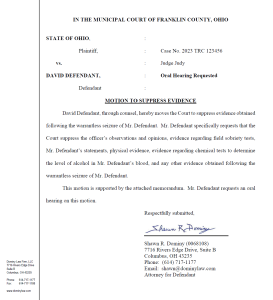 Following a DUI arrest (called ‘OVI’ in Ohio), it is common for an officer to search the suspect’s vehicle before having the vehicle towed. This ‘inventory search’ is an exception to the general requirement of a search warrant. For an inventory search to be valid, it must be done in accordance with the policy of the law enforcement agency. A recent case decided by the Ohio Supreme Court addressed what evidence is necessary to prove the search complied with the law enforcement agency’s policy. Continue Reading
Following a DUI arrest (called ‘OVI’ in Ohio), it is common for an officer to search the suspect’s vehicle before having the vehicle towed. This ‘inventory search’ is an exception to the general requirement of a search warrant. For an inventory search to be valid, it must be done in accordance with the policy of the law enforcement agency. A recent case decided by the Ohio Supreme Court addressed what evidence is necessary to prove the search complied with the law enforcement agency’s policy. Continue Reading
Articles Tagged with OMVI
DUI/OVI and Hit-Skip in Ohio
 A police officer was recently charged with DUI (called ‘OVI’ in Ohio) and Fleeing the Scene of an Accident. According to News 13 in Myrtle Beach, the officer is a sergeant who serves as the supervisor of the traffic division. In our OVI defense practice, we have represented clients suspected of OVI and Failure to Stop After Accident (commonly called ‘Hit-Skip’). In some cases, the driver is charged only with Hit-Skip. In other cases, the driver is charged with both Hit-Skip and OVI. Drivers in those situations also face the possibility of being charged with felony offenses.
A police officer was recently charged with DUI (called ‘OVI’ in Ohio) and Fleeing the Scene of an Accident. According to News 13 in Myrtle Beach, the officer is a sergeant who serves as the supervisor of the traffic division. In our OVI defense practice, we have represented clients suspected of OVI and Failure to Stop After Accident (commonly called ‘Hit-Skip’). In some cases, the driver is charged only with Hit-Skip. In other cases, the driver is charged with both Hit-Skip and OVI. Drivers in those situations also face the possibility of being charged with felony offenses.
Miranda Violations Lead to New Trial in DUI Murder Case
 When a suspect is in the custody of a law enforcement officer, the officer must provide Miranda warnings before questioning the suspect. If the officer does not give sufficient warnings, the suspect’s statements made in response to questioning cannot be used at trial. In a recent DUI Murder case in California, Miranda violations resulted in an appeals court ordering a new trial.
When a suspect is in the custody of a law enforcement officer, the officer must provide Miranda warnings before questioning the suspect. If the officer does not give sufficient warnings, the suspect’s statements made in response to questioning cannot be used at trial. In a recent DUI Murder case in California, Miranda violations resulted in an appeals court ordering a new trial.
How Does a DUI/OVI in Ohio Affect Employment?
 Following his recent arrest for DUI (called ‘OVI’ in Ohio), Bob Huggins resigned from his position as the men’s basketball coach at West Virginia University. His situation is illustrative of many high-profile individuals who have lost jobs due to a DUI/OVI. But it is not only high-profile individuals who face employment consequences for OVI cases. We are frequently asked the following questions about OVI cases and employment.
Following his recent arrest for DUI (called ‘OVI’ in Ohio), Bob Huggins resigned from his position as the men’s basketball coach at West Virginia University. His situation is illustrative of many high-profile individuals who have lost jobs due to a DUI/OVI. But it is not only high-profile individuals who face employment consequences for OVI cases. We are frequently asked the following questions about OVI cases and employment.
What is Sufficient Proof of Drugged Driving in Ohio?
 When a driver is prosecuted for operating a vehicle under the influence of drugs (called ‘OVI’ in Ohio), what evidence is sufficient to sustain a conviction? The prosecution must prove the defendant operated a vehicle under the influence of a drug of abuse. That requires the prosecution to prove the defendant was impaired while operating the vehicle, identify the specific drug which was ingested, and link the drug’s ingestion to the defendant’s impairment.
When a driver is prosecuted for operating a vehicle under the influence of drugs (called ‘OVI’ in Ohio), what evidence is sufficient to sustain a conviction? The prosecution must prove the defendant operated a vehicle under the influence of a drug of abuse. That requires the prosecution to prove the defendant was impaired while operating the vehicle, identify the specific drug which was ingested, and link the drug’s ingestion to the defendant’s impairment.
Motions To Suppress Evidence in Ohio DUI / OVI Cases
 I recently came across this article in an Ohio newspaper: Judge Denies Motion to Suppress Evidence. What does that mean in a DUI case (called ‘OVI’ in Ohio)? When a judge orders that evidence is suppressed, the evidence is excluded from trial. That means, even though the evidence existed, the jury does not hear about it. The two general bases for suppressing evidence are: (1) violations of the defendant’s Constitutional rights; and (2) the government’s failure to comply with statutory (legislative) law.
I recently came across this article in an Ohio newspaper: Judge Denies Motion to Suppress Evidence. What does that mean in a DUI case (called ‘OVI’ in Ohio)? When a judge orders that evidence is suppressed, the evidence is excluded from trial. That means, even though the evidence existed, the jury does not hear about it. The two general bases for suppressing evidence are: (1) violations of the defendant’s Constitutional rights; and (2) the government’s failure to comply with statutory (legislative) law.
Repeat DUI /OVI Offenses in Ohio
 According to a story by NBC4i, the Ohio State Highway Patrol reports that 30% of DUI arrests (called ‘OVI’ in Ohio’) come from repeat offenders. In Ohio, the mandatory OVI penalties increase with every conviction in ten-years (called the ‘lookback period’). Those penalties include vehicle sanctions, license suspensions, incarceration, and other consequences.
According to a story by NBC4i, the Ohio State Highway Patrol reports that 30% of DUI arrests (called ‘OVI’ in Ohio’) come from repeat offenders. In Ohio, the mandatory OVI penalties increase with every conviction in ten-years (called the ‘lookback period’). Those penalties include vehicle sanctions, license suspensions, incarceration, and other consequences.
Ohio’s Heightened DUI/OVI Enforcement for Super Bowl LVII
 There is a lot of Super Bowl planning going on. Rihanna is planning what songs to sing. Tom Brady is planning to make an appearance as a broadcaster (and later announce his second un-retirement?). Party hosts are planning what food to serve. I am planning to miss our annual party due to Covid (cruel timing). And Ohio law enforcement agencies are planning to arrest drunk drivers.
There is a lot of Super Bowl planning going on. Rihanna is planning what songs to sing. Tom Brady is planning to make an appearance as a broadcaster (and later announce his second un-retirement?). Party hosts are planning what food to serve. I am planning to miss our annual party due to Covid (cruel timing). And Ohio law enforcement agencies are planning to arrest drunk drivers.
Change of Venue for Serious Vehicular Crimes in Ohio
 The issue of venue recently arose in an Ohio Vehicular Homicide case. As reported by the Leader-Telegram, the defendant was accused of hitting two highway workers in Clark County. As a result of the collision, one worker died, and the other was seriously injured. The defense attorney filed a motion for change of venue. What is venue, and when can it be changed?
The issue of venue recently arose in an Ohio Vehicular Homicide case. As reported by the Leader-Telegram, the defendant was accused of hitting two highway workers in Clark County. As a result of the collision, one worker died, and the other was seriously injured. The defense attorney filed a motion for change of venue. What is venue, and when can it be changed?
Continue Reading
No Contest Pleas in Ohio DUI/OVI Cases
 Rejecting a No Contest plea may be an abuse of a judge’s discretion, according to a case decided last week by the Ohio Supreme Court. A plea of No Contest is different than a guilty plea, and the plea of No Contest is used for two purposes in DUI (called ‘OVI’ in Ohio) cases. Although a judge’s approval is required for a plea of No Contest, the case decided last week makes it clear a judge’s refusal to give approval may be overturned.
Rejecting a No Contest plea may be an abuse of a judge’s discretion, according to a case decided last week by the Ohio Supreme Court. A plea of No Contest is different than a guilty plea, and the plea of No Contest is used for two purposes in DUI (called ‘OVI’ in Ohio) cases. Although a judge’s approval is required for a plea of No Contest, the case decided last week makes it clear a judge’s refusal to give approval may be overturned.
Continue Reading
 Columbus OVI/DUI Attorney Blog
Columbus OVI/DUI Attorney Blog

